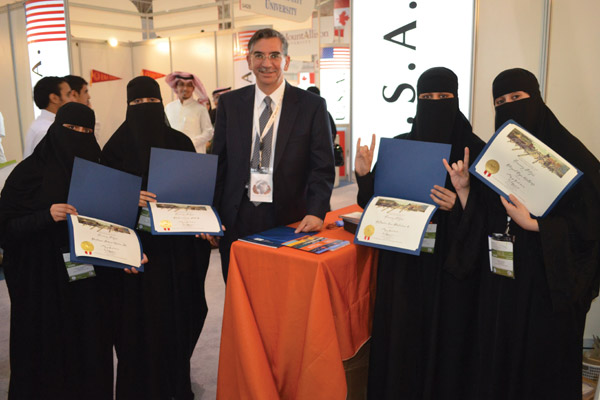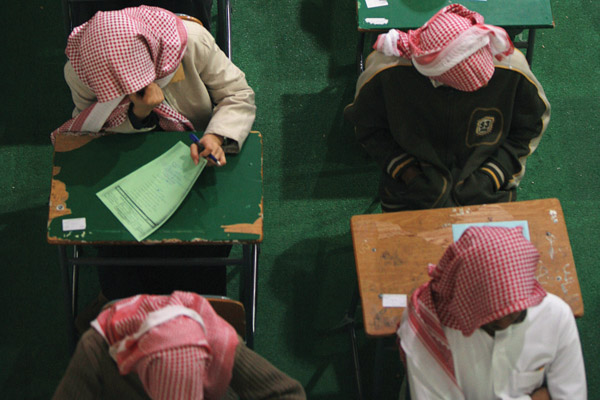Applying top teacher-training principles into different cultural frameworks
Inspiring. Knowledgeable. Passionate. These descriptions often tumble forth when people are asked to recall their favorite teacher. Good teachers help students pass tests, but great teachers spark critical thinking, bring subjects to life and encourage students to pursue their passions.
Since 2001, The University of Texas at Austin’s UTeach-Liberal Arts program has been producing teachers of this caliber. Now the renowned teacher-training program is extending its efforts to universities across the globe.
This year alone, representatives from UTeach-Liberal Arts met with education and policy leaders in Guatemala and Saudi Arabia to introduce their unique approach to teacher training. The overseas initiatives are a joint effort with the Austin-based Alhambra-U.S. Chamber of Commerce, a nonprofit that promotes diplomatic, commercial and educational interaction across the globe.
A nationally recognized teacher preparation program, UTeach-Liberal Arts emphasizes combining in-depth pedagogical knowledge with practical, hands-on field experience in public school classrooms.
“We show our teachers how to use their classroom as a place to develop lifelong learners,” says Richard Flores, senior associate dean of academic affairs for the College of Liberal Arts and director of the UTeach-Liberal Arts program. “Teachers need to give their students a sense of inquiry and encourage critical thinking so they will want to continue learning beyond the classroom. Those values are important in any society.”
Through workshops, Q&A panels, international conferences and one-onone meetings with education officials and policy leaders, the UTeach-Liberal Arts/Alhambra delegation introduced the program’s key principles for experience, in-depth knowledge and active-learning classrooms.
The challenge, Flores says, is to apply the program’s principles in a very different culture. So to better understand their needs, the delegates focused much of their time overseas to listening and conversing with key decision-makers in higher education.
“I don’t believe we can simply transplant our program into another country because there are very different historical and educational traditions, norms and values to take into consideration,” Flores says. “So it’s a matter of taking our principles and adapting them into a new cultural framework. And that’s something I believe we can do.”

Bridging the Language Gap
With a focus on bringing developing nations to the world stage, Alhambra searched for markets with a strong desire for English as a second language (ESL) instruction. The nation that kept coming up in their research was Guatemala, says Alhambra’s co-founder and executive director Anjum Malik.
“Few skills are as useful in the global economy and as beneficial for an individual’s marketability as functionality in English,” Malik says. “Our meetings in UAE, Saudi Arabia and Guatemala revealed significant interest and commitment in this area. We are excited to work with local partners in Guatemala to further develop their education initiatives.”
During their visit in July, the delegates met with a host of education and policy leaders and introduced UTeach-Liberal Arts’ innovative approach to teacher training. Among the many top decision-makers in Guatemala’s education system, the delegates built new relationships with representatives from the office of the president as well as the minister of education, key cabinet ministers and the presidents of Guatemala’s premier universities.
Given the challenges of implementing teacher training reforms in Guatemala’s public education sector, Flores and his team decided to start the conversation with education leaders in the private university system as well. In time, Flores hopes both public and private education sectors will adopt the principles gleaned from the UTeach- Liberal Arts model.
“After our meetings, it is clear UTeach-Liberal Arts can work with local educators in strengthening teacher education,” Flores says. “We discussed a series of possibilities that were well received and we look forward to developing partnerships in Guatemala.”
Answering the Call to Action
The Guatemala mission is the second joint endeavor between the two groups. Last spring, UTeach-Liberal Arts and Alhambra carried out their first successful international outreach initiative in Saudi Arabia and the United Arab Emirates — a region where Alhambra’s ties are especially strong.
During the Alhambra-facilitated mission, UTeach-Liberal Arts faculty presented at the International Exhibition and Conference on Higher Education in Riyadh, the world’s largest higher education conference, which attracts more than 400,000 students, teachers and education officials each year.
“It was inspiring to see so many students in Saudi Arabia interested in coming to Texas for their education,” Flores says. “Another highlight of the conference was meeting with university officials who were eager to partner with us.”
In addition to networking with hundreds of students and educators at the conference, Alhambra arranged meetings with the minister of higher education for Abu Dhabi; deputy minister of education for Saudi Arabia; the Office of the First Lady of Dubai; the leadership team of Aramco, Sabic and GOSI; and top leaders from more than 100 regional and international universities.
Now Flores and the Alhambra team are drafting a proposal for business and education leaders in Abu Dhabi. With a focus on innovation and creativity, Flores is working with several units across campus to bring the best of The University of Texas at Austin to this part of the world.
The plan will include expertise from Human Dimensions of Organizations, a new master’s and executive seminar program in the College of Liberal Arts. Flores will also recruit faculty from the university’s IC2 Institute, an interdisciplinary research unit that focuses on advancing entrepreneurial wealth creation.
Setting the Foundation
Based on the successful outcome of the Middle East and Guatemala delegations, Alhambra invited UTeach-Liberal Arts to join the State Department’s Partners for a New Beginning program on a higher education delegation to North Africa in June. During the trip, Flores met with universities, nonprofits and business leaders from Algeria, Morocco and Tunisia to discuss the higher education challenges in each country.
To get a better understanding of which direction the North African school systems want to take in education reform, Flores and his team participated in a Q&A session with students and educators.
Among the many highlights of his overseas missions, Flores said he was most inspired by the students’ interest in getting a quality education. That desire was especially prevalent among students in Tunisia, where classroom instruction is often framed around memorization and rote learning.
“After the revolution, college students have very high expectations of what they can accomplish in education,” Flores says. “These students are expecting change, and they’re looking for it.”
Flores recently worked with the Aspen Institute and its Partners for a New Beginning program on a report pinpointing the challenges and proposed solutions for higher education in North Africa. Though they have only taken preliminary steps toward making a difference, Flores believes these new partnerships will lead to significant improvements in teaching practices throughout the developing world.
By implementing UTeach-Liberal Arts’ core principles, teachers will have the ability to inspire a new generation of scholars and thought leaders, says Rose Potter, UTeach-Liberal Arts clinical professor.
“Well-trained teachers have the instructional tools to create student-centered, active learning classrooms,” says Potter, who accompanied Flores in the Middle East delegation. “When students become successful learners, everyone wins. That includes students, their teachers, their parents, the community, employers, the nation as a whole and ultimately our shared world.”
